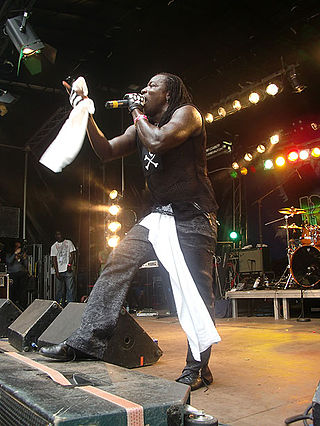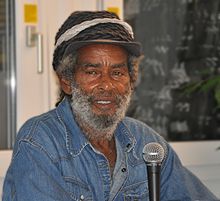
Lee "Scratch" Perry was a Jamaican record producer, composer and singer noted for his innovative studio techniques and production style. Perry was a pioneer in the 1970s development of dub music with his early adoption of remixing and studio effects to create new instrumental or vocal versions of existing reggae tracks. He worked with and produced for a wide variety of artists, including Bob Marley and the Wailers, Junior Murvin, The Congos, Max Romeo, Adrian Sherwood, Beastie Boys, Ari Up, The Clash, The Orb, and many others.

James Chambers, OM, known professionally as Jimmy Cliff, is a Jamaican ska, rocksteady, reggae and soul musician, multi-instrumentalist, singer, and actor. He is the only living reggae musician to hold the Order of Merit, the highest honour that can be granted by the Jamaican government for achievements in the arts and sciences.
"Israelites" is a song written by Desmond Dekker and Leslie Kong that became a hit for Dekker's group, Desmond Dekker & the Aces, reaching the top of the charts in numerous countries in 1969. Sung in Jamaican Patois, some of the song's lyrics were not readily understood by many British and American listeners at the time of its release. Despite this, the single was the first UK reggae #1 and among the first to reach the US top ten. It combined the Rastafarian religion with rude boy concerns, to make what has been described by Allmusic as a "timeless masterpiece that knew no boundaries".

Kenneth George Boothe OD is a Jamaican vocalist known for his distinctive vibrato and timbre. Boothe achieved an international reputation as one of Jamaica's finest vocalists through a series of crossover hits that appealed to both reggae fans and mainstream audiences.

The Ethiopians were one of Jamaica's best-loved harmony groups during the late ska, rocksteady and early reggae periods. Responsible for a significant number of hits between the mid-1960s and early 1970s, the group was also one of the first Jamaican acts to perform widely in Britain.

Von Wayne Charles, better known by his stage name Wayne Wonder, is a Jamaican reggae artist. While his early recordings were dancehall and reggae, he later moved towards hip hop and rap. His most popular single is the 2003 hit "No Letting Go".

Dennis Emmanuel Brown CD was a Jamaican reggae singer. During his prolific career, which began in the late 1960s when he was aged eleven, he recorded more than 75 albums and was one of the major stars of lovers rock, a subgenre of reggae. Bob Marley cited Brown as his favourite singer, dubbing him "The Crown Prince of Reggae", and Brown would prove influential on future generations of reggae singers.
Boris Gardiner is a Jamaican singer, songwriter and bass guitarist. He was a member of several groups during the 1960s before recording as a solo artist and having hit singles with "Elizabethan Reggae", "I Wanna Wake Up with You" and "You're Everything to Me". One of his most notable credits is bass on the influential reggae song "Real Rock".
Clancy Eccles was a Jamaican ska and reggae singer, songwriter, arranger, promoter, record producer and talent scout. Known mostly for his early reggae works, he brought a political dimension to this music. His house band was known as The Dynamites.

Marion Hall is a Jamaican singer and songwriter whose career has spanned over two decades. Formerly known as the Queen of Dancehall, she is best known for her guest appearance on No Doubt's "Underneath It All," which went triple Platinum and won a Grammy for No Doubt.

Junior Murvin was a Jamaican reggae musician. He is best known for the single "Police and Thieves", produced by Lee "Scratch" Perry in 1976.
Barry Biggs is a Jamaican reggae singer, best known in the UK for his cover of the Blue Magic song, "Sideshow", which got to number 3 in the UK Singles Chart in 1977.
The Pioneers are a Jamaican reggae, soul and rocksteady vocal trio, whose main period of success was in the 1960s. The trio has had different line-ups, and still occasionally performs.
Delroy "Junior" Reid is a Jamaican reggae and dancehall deejay. From 1986 to 1988, he served as lead vocalist for the reggae band Black Uhuru on three albums: Brutal (1986), Positive (1987), and Black Uhuru Live in New York (1988). His solo career is extensive, and is widely regarded as a great of Dancehall Reggae. He is also known for his guest performances on the Game's 2006 single "It's Okay ", as well as the remix of Mims' single, "This Is Why I'm Hot" alongside Baby Cham that same year.

Ewart Everton Brown, better known by his stage name Mad Cobra or simply Cobra, is a Jamaican dancehall musician.

Clifford Smith, better known as Mr. Vegas, is a Jamaican dancehall singjay.
Ainsworth Roy Rushton Shirley, better known simply as Roy Shirley, and also known as King Roy Shirley and The High Priest, was a Jamaican singer whose career spanned the ska, rocksteady and reggae eras, and whose "Hold Them" is regarded by some as the first ever rocksteady song. He was also one of the original members of Slim Smith's band, The Uniques.
Owen Gray, also known as Owen Grey, is a Jamaican musician. His work spans the R&B, ska, rocksteady, and reggae eras of Jamaican music, and he has been credited as Jamaica's first home-grown singing star.

Andrae Hugh Sutherland, known professionally as Popcaan, is a Jamaican dancehall singer.
"Wet Dream" is a song by Jamaican reggae singer Max Romeo first released in 1968 on the Unity Records label. The song, with its controversial lyrics, remains Romeo's biggest commercial hit.












